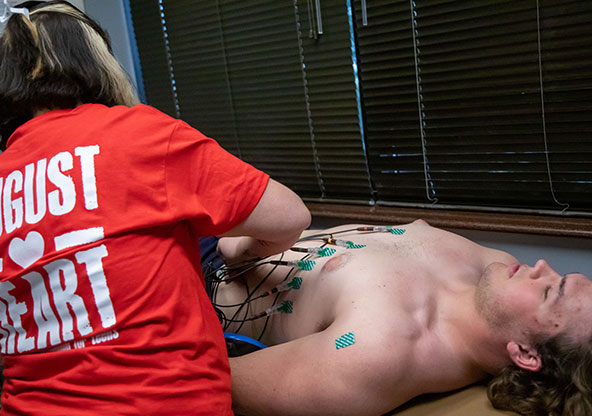Student Athlete Heart Screenings

Student athlete heart checks are essential for detecting any underlying heart conditions that could put athletes at risk of sudden cardiac arrest.
The American Heart Association recommends that student-athletes undergo a pre-participation screening form to identify any symptoms or family history of heart disease.
During football, basketball, and baseball season, athletes of all ages come through with various injuries ranging from concussions to shoulder and knee pain to foot injuries associated with every sport. Fortunately, student-athletes can receive cardiac screenings, which can help identify patients with potential heart-related issues while on the field.
At CHRISTUS Santa Rosa Hospital- Alamo Heights, students received free heart screenings from August Heart, an organization in San Antonio that provides heart screenings to young student-athletes.
An ECG is a safe, painless and non-invasive procedure that can last around 10 minutes - helping to detect any potential issues. However, it is essential to note that an ECG cannot guarantee safety from sudden cardiac arrest and may produce false positives.
Help Take Care of Your Heart Here
What Do Physicians Recommend?
Physicians recommend that student-athletes receive a cardiac screening before participating in competitive sports to uncover any hidden issues or health concerns. In addition, cardiac screenings can help ensure the safety of athletes and reduce the chances of sudden death due to undetected heart complications.
"Fortunately, cardiac events are relatively rare," said Dr. Matthew Murray, an orthopedic sports medicine surgeon. "It is important to get in for an evaluation and not necessarily to be an echocardiogram or an EKG but just a good physical exam."
Karla Villarreal recently took her two kids, who play sports in junior high and high school, for a heart screening.
After Damar Hamlin, a football player on the Buffalo Bills, collapsed on the football field from cardiac arrest, Karla wanted to see if her young athletes had healthy hearts.
"They both play hard sports, baseball and soccer. So I was like, I just want to know before, you know, something happened," Villarreal said. "If something's wrong, I know I can take them to the pediatrician and start a treatment, or I can work with their pediatricians."
Sports physicals are essential. Still, they don't always show who is the most vulnerable to cardiac arrest.
Sometimes more tests are needed.
Jenny Cummings also visited CHRISTUS Santa Rosa Hospital- Alamo Heights during a free heart clinic and had her child athlete screened for a heart condition.
She wants to be proactive.
"The more information we can have, the more at peace I feel, and the more I think we can focus on our health moving forward and being proactive instead of reactive," Jenny said.
Heart Screens for Cardiac Conditions that Affect Student Athletes
- Hypertrophic Cardiomyopathy affects approximately 1 in 500 people and causes the ventricles at the base of the heart to become abnormally enlarged.
- Dilated Cardiomyopathy, affecting an estimated 1 in 2000 people, is a type of heart condition in which the heart muscle becomes enlarged and fails to contract properly.
- Aortic Root Aneurysm is an uncommon yet potentially life-threatening problem that affects approximately one in every ten thousand people. To detect this condition, individuals must first have an echocardiogram (ultrasound) before moving on to further screening procedures.
- Long QT Syndrome is an electrical malfunction of the heart caused by a disruption in how the heart muscle handles essential elements like sodium and potassium. This condition can cause irregular heartbeat and even sudden death, with an estimated incidence of 1 in 5,000 people.
- Wolff-Parkinson-White Syndrome is a type of cardiac electrical abnormality caused by an anomalous link between the heart's superior and inferior chambers. Affecting about 1 in every 1500 people, signs can include rapid heartbeat or arrhythmias.
Schedule a Screening
If you are concerned about your heart health or have any questions regarding sudden cardiac arrest, it is best to speak with your doctor. While prevention cannot be guaranteed, early detection is key to minimizing risk and ensuring optimal outcomes should something occur.
Be proactive with your health - know the signs and symptoms of heart problems, get regular check-ups and consult with your physician if you experience any unusual discomfort or changes in activity level. These preventive measures can help reduce the risk of sudden cardiac death in young adults.

